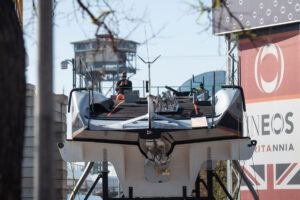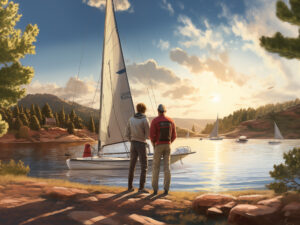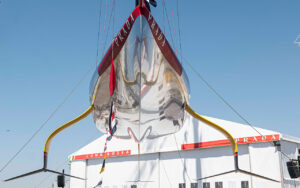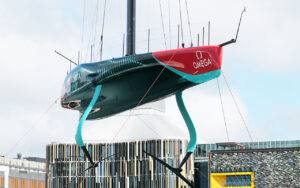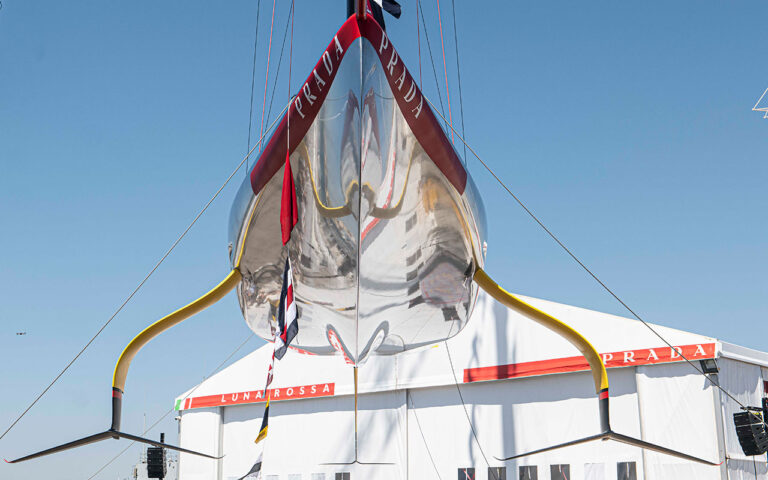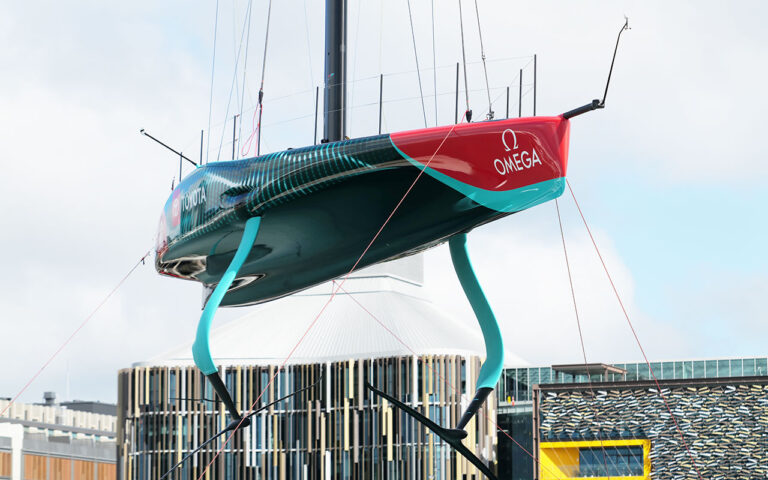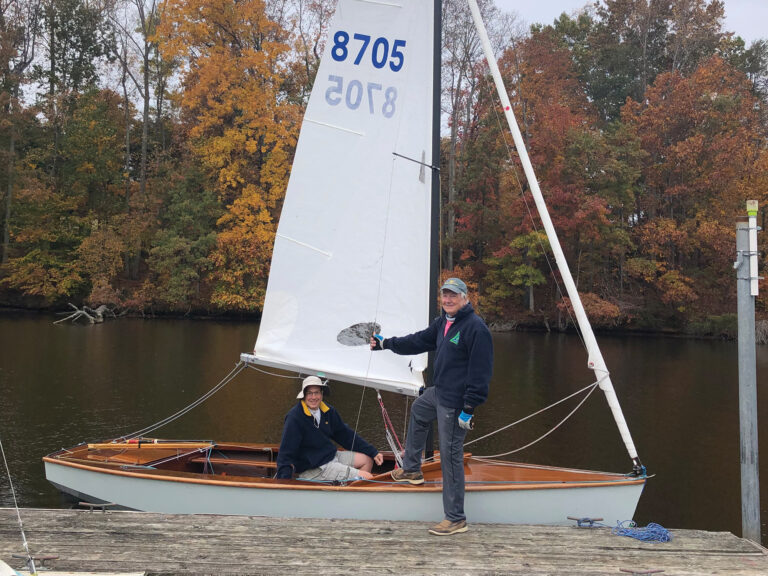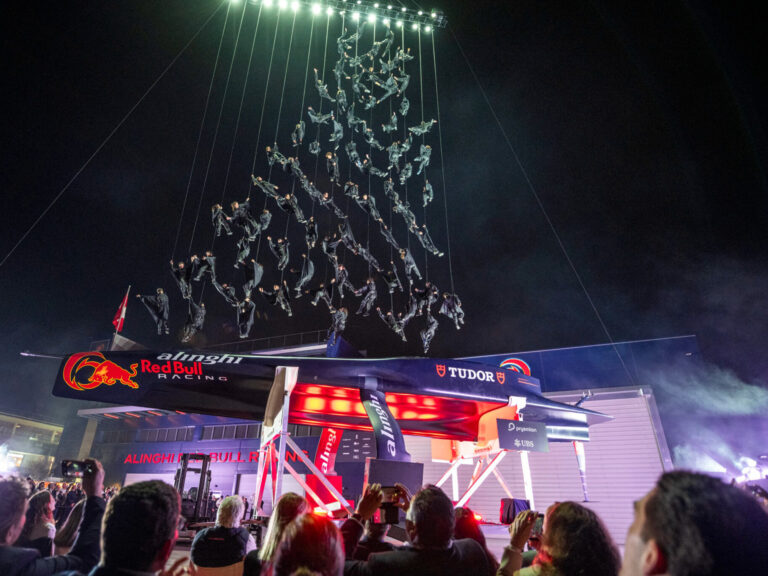For the second time, the Royal Canadian YC won the Canada’s Cup with skipper Terry McLaughlin at the helm of his and Paul Phelan’s Farr 40 Defiant, beating Bob Hughes’ and his Farr 40 Heartbreaker. The race score was identical to 2001, 7 to 5, and many crewmembers were the same. McLaughlin, a 47-year-old financial consultant in Toronto, talked with Sailing World’s editor, John Burnham today.Two excellent teams. What was the difference?It was a good series. We won one race by 2 seconds and one by 1 to 2 feet. Both teams were pretty close to what they were in 2001. For some reason they seemed to have a little speed advantage on us when the wind was up, and most of the races were started in 15 to 18 knots. We adjusted some things and maybe closed the gap, but they have always been very fast. I think Heartbreaker was the fastest boat at the SORC last winter, so maybe their boat or keel is better than ours, but they seemed to have an advantage we couldn’t completely eliminate. Fortunately we were able to counterbalance that by winning most of the starts and then either hanging on or, in a number of races, we got passed. By our count we only lost one start. We got going in the direction we wanted either ahead of them or at the right end of the starting line in 11 of 12 races. Did you have any advantage, upwind or down?I don’t know why but except for one race we won comfortably, it always seemed there would be a little shift, and we’d get to the weather mark and they’d be right behind us. Generally speaking when we got ahead we couldn’t shake them, and when they got ahead it was much easier for them to get a bit of a gap between us.What was your approach to the starts?Again it was similar to 2001. We were probably more aggressive. Andy Horton, my tactician, had just come from doing the world circuit with Ed Baird. And we had five long weekends sailing against the good guys. We did one weekend against Jeff Madrigali, then Chris Larson, and then three different weekends we had Ed Baird up here. Perhaps to our detriment we didn’t concentrate on speed because it’s harder to do–you need good, equal sails. But we did a lot of match racing and starting. That helped shake the rust off me a little bit, and Andy was very current with what’s happening on the world match racing circuit. Also, Dave Scott on the mainsheet was very good before the start at anticipating what I’m about to do next, even though I don’t tell him. When we came in on starboard, we’d always dial them up. They were often more content to take off to the starboard side of the starting area in good position. There were a number of flags, but no penalties–in 2001 I think we had one penalty assigned. Lots of spinning, not so much luffing head the wind. Was it too breezy for that?I always hate these regattas where you spend a fortune on sails and the first thing you do is go out and flog them going head to wind–not that that really entered into the tactics–but it was little dangerous in big waves to be to windward and try to hold position. If we were on starboard, we were trying to protect the right side–for some reason no matter what direction the wind was, the lead boat at the weather mark got to the right first. It just happened to be that way that week, so when we could we would try to keep Heartbreaker away from the committee boat end. We probably preferred to get them luffing very slow on starboard, and when we knew they couldn’t get to port very easily, we’d tack, take off on port, and get some speed up, and then come back and get them before they could get speed up and get out of it. They were less aggressive, and that’s probably just a function of the difficulty of tactician-helsman communication before the start. John Kostecki, their tactician, is very experienced but Bob is less experienced at the start, and I don’t think it works too well when you have a tactician telling you what to do before the start. There’s just too much of a delay sometimes. The final score was 7-5. Was there a key race or a turning point?Not really. In the first race we led at the weather mark by a few boatlengths, but on the hoist they dropped their jib in the water and the halyard got over the bow. They had to take their spinnaker down to get the jib back aboard. That was sort of a gift for us. Then we went on to win the next two races, so we had a good lead, which was nice, but then before we knew it, it was three all. They came back and won three in a row, and on Monday, we had two fairly breezy races, and we were probably at our slowest. They won both fairly handily.You’d been in a commanding position, and now it’s even and you’re worrying about your boatspeed.We made some changes after that day, which seemed to even things up. The next day we won the first race and then lost the second. So after Tuesday it’s 4-all. We won two races the next day, and now it’s more comfortable again–we only need one more. We went out the first race and led, but then at the leeward mark we had a little miscommunication which let them get by us on the beat. I didn’t realize how badly Andy wanted to tack right and we were a little disorganized on the bow. Our bowman Ian Smith had hurt his back during the first race on Sunday, and our floater, Al Megarry went up and did the bow for the rest of the race; afterwards we had a doctor look at Ian and we concluded he shouldn’t race anymore.How did you find a substitute?There were spectator boats, but it’s a little difficult to find a bowman who weighs under 170 pounds with experience on a Farr 40 and has done some match racing. We were radioing around with the permission of the jury and we found two reasonably good sailors who fit the weight requirements, so we chose a guy we knew who wasn’t a bowman but had sailed lots of J/24s. He did the floater job, and Alan Megarry did the the bow for the rest of the regatta. We didn’t have any major screwups but we had some minor problems; things didn’t go as as smoothly as they would’ve with a regular crew there.So it came down to the 12th race.Just like in Detroit in 2001, if we’d lost the 12th race, we’d have had a one race for the regatta. It was a pretty classic match race. We won the start and just covered real tight. We had a northwest wind, very puffy and shifty. We couldn’t let them go–it was tempting to just go for the next shift–but Andy kept us tight. On the first beat we had 35 tacks, and once again you look up and they’re right behind you at the first mark. The second and third beats were the same–tack, tack, tack. We got a bit of a lead but sure enough on the last run, they closed up to within a couple lengths, but not quite close enough.Lots of adrenaline flow, it sounds like.A number of our yacht club members were complaining that there nails were a lot shorter by the end of the regatta. Fortunately we’d done enough practice in tight situations that we were able to stay calm when the pressure was on.Who were your other crewmembers?Geoff Moore was jib trimmer and did the guy. Phil Gow trimmed the jib also and the spinnaker. John Millen was in the pit and Rob Gale, the mast. Our replacement floater was Rossi Milev, a former Bulgarian 470 sailor who lives near Toronto.Is it the tradition of the Canada’s Cup that was worth the effort or is the purity of the competition more important?The Canada’s Cup means a lot to RCYC , and there haven’t been that many of them, but it’s been going on since 1896. I never had a chance to participate in it before 2001, so the history meant a lot to me, plus it’s match racing, which is a lot of fun to do. Doing it in one-design boats for the first time in 2001 guaranteed that it would be good racing. Have you received the next challenge yet?I don’t think so. I haven’t heard.You had a pretty good run going at the Farr 40 Worlds last year and it didn’t pan out for you. Will you do the next Farr 40 Worlds in San Francisco?I’m not sure. I might need to take some time off and concentrate on other things. But it’s always a lot of fun–win, lose, or DSQ–it’s always fun sailing those boats. If you had to pick match racing or fleet racing and you could only pick one to do from this point on, which would it be?I like team racing the best, but there’s not too much of it here.
